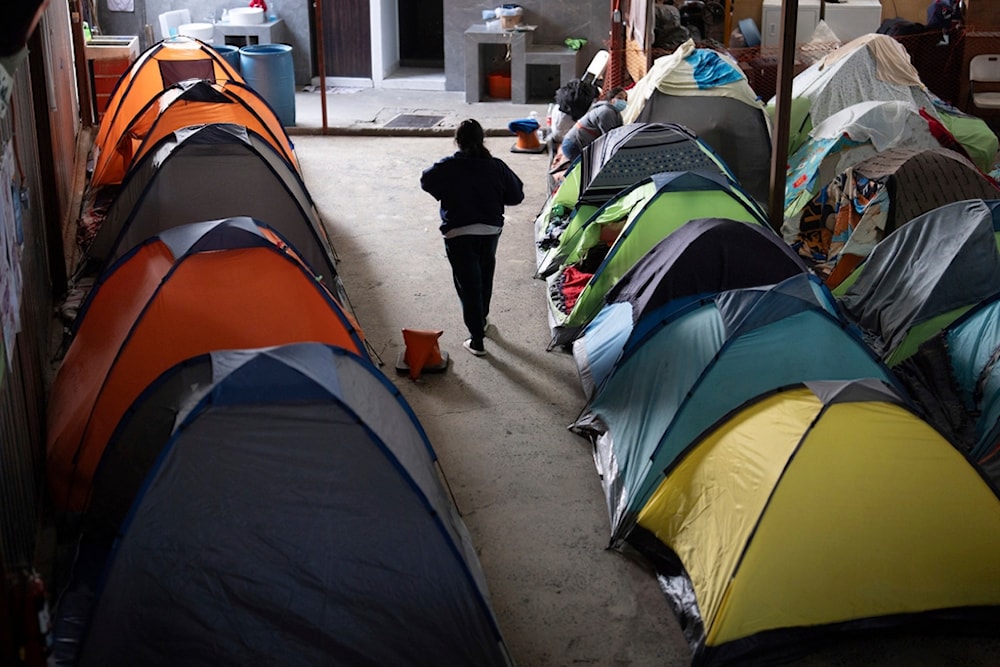Mexico border cities mobilize shelters amid Trump's deportation drive
The Mexican government is constructing nine shelters in border cities to accommodate deportees.
-

A migrant woman from the Mexican state of Guerrero walks among tents at a migrant shelter Wednesday, Jan. 22, 2025, in the border city of Tijuana, Mexico (AP)
Mexico erected expansive tent shelters along the US border on Wednesday in anticipation of President Donald Trump following through on his pledge to conduct mass deportations.
In Ciudad Juarez, just across from El Paso, Texas, cranes worked to assemble metal frames for the shelters on an empty lot adjacent to the border, the Associated Press reported.
Enrique Serrano, a Chihuahua state official where Ciudad Juarez is located, explained that the tents erected for Mexican deportees were part of an initial phase of preparations.
He noted that authorities would scale up operations if the number of migrants at the border continued to grow.
Serrano added that migrants from other countries deported from the US would likely be relocated to Mexico City or southern regions, consistent with previous practices.
In Nogales, Mexico, across from Nogales, Arizona, officials announced plans to build shelters in gymnasiums and on soccer fields. Meanwhile, the border cities of Matamoros and Piedras Negras have undertaken similar initiatives.
At a Tijuana border crossing on Tuesday night, a man shouted to journalists that he was being deported as part of a group arrested earlier that day in farm fields near Denver.
Another individual claimed he had been transported from Oregon. Both carried small orange bags containing their belongings, but their accounts could not be independently verified.
According to Mexican President Claudia Sheinbaum, the number of deportations on Tuesday was lower than last year's daily average of approximately 500. Many border shelters, which had previously faced overwhelming numbers, remained relatively empty compared to the high influx seen a year ago.
Nonetheless, leaders of migrant shelters like Jose Maria Garcia, director of Tijuana’s Movimiento Juventud 2000, expressed concern about what might unfold.
"Mass deportations in the United States and the arrival of thousands of migrants from the south could overwhelm the city of Tijuana and other border cities, creating a crisis," he warned.
Executing mass deportations, as Trump has vowed, would present significant logistical and financial hurdles.
The Mexican government is constructing nine shelters in border cities to accommodate deportees. It confirmed that existing facilities in Tijuana, Ciudad Juarez, and Matamoros will also be utilized to house migrants whose US asylum appointments were canceled on Inauguration Day.
Sheinbaum emphasized Mexico's commitment to providing humanitarian aid to migrants from other countries whose asylum applications were canceled, as well as those required to remain in Mexico under the reinstated “Remain in Mexico” policy.
She added that Mexico aims to facilitate their eventual voluntary return to their home countries.
Mexican Foreign Affairs Secretary Juan Ramon de la Fuente held a telephone conversation with US Secretary of State Marco Rubio.
“It was a very good conversation, very cordial, they talked about migration and security issues,” Sheinbaum indicated.
Earlier this week, Trump ended the CBP One program, which allowed asylum seekers to schedule border appointments via their phones, introducing an element of order to the process. On Wednesday, the Pentagon announced the deployment of up to 1,500 active-duty troops to the border.
In Tijuana, Garcia noted ongoing discussions about assisting border cities in preparing for an anticipated influx of migrants. The Mexican government also plans to bus some deportees back to their hometowns and provide them with 2,000 pesos (roughly $100) to meet their basic needs upon arrival at the border.
Read more: Following his inauguration, Panama, Mexico vow to fight Trump schemes

 4 Min Read
4 Min Read








